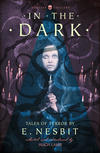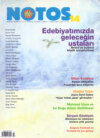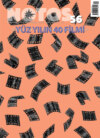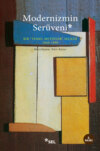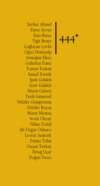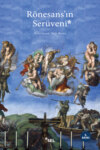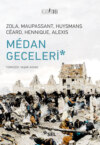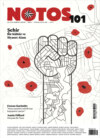Kitabı oku: «Victorian Short Stories: Stories of Courtship», sayfa 4
II
The music rolled through the dark, empty church. The last, leaden flicker of daylight glimmered in through the pointed windows, and beyond the level rows of dusky pews, tenanted only by a litter of prayer-books, two guttering candles revealed the organ pipes, and the young girl's swaying figure.
She played vigorously. Once or twice the tune stumbled, and she recovered it impatiently, bending over the key-board, showily flourishing her wrists as she touched the stops. She was bare-headed (her hat and cloak lay beside her on a stool). She had fair, fluffy hair, cut short behind her neck; large, round eyes, heightened by a fringe of dark lashes; rough, ruddy cheeks, and a rosy, full-lipped, unstable mouth. She was dressed quite simply, in a black, close-fitting bodice, a little frayed at the sleeves. Her hands and neck were coarsely fashioned: her comeliness was brawny, literal, unfinished, as it were.
When at last the ponderous chords of the Amen faded slowly into the twilight, flushed, breathing a little quickly, she paused, listening to the stillness of the church. Presently a small boy emerged from behind the organ.
'Good evenin', Miss Rosa', he called, trotting briskly away down the aisle.
'Good night, Robert', she answered, absently.
After a while, with an impatient gesture, as if to shake some importunate thought from her mind, she rose abruptly, pinned on her hat, threw her cloak round her shoulders, blew out the candles, and groped her way through the church, towards the half-open door. As she hurried along the narrow pathway that led across the churchyard, of a sudden, a figure started out of the blackness.
'Who's that?' she cried, in a loud, frightened voice.
A man's uneasy laugh answered her.
'It's only me, Rosa. I didna' think t' scare ye. I've bin waitin' for ye, this hoor past.'
She made no reply, but quickened her pace. He strode on beside her.
'I'm off, Monday, ye know,' he continued. And, as she said nothing, 'Will ye na stop jest a minnit? I'd like t' speak a few words wi' ye before I go, an tomorrow I hev t' git over t' Scarsdale betimes,' he persisted.
'I don't want t' speak wi' ye: I don't want ever to see ye agin. I jest hate the sight o' ye.' She spoke with a vehement, concentrated hoarseness.
'Nay, but ye must listen to me. I will na be put off wi' fratchin speeches.'
And gripping her arm, he forced her to stop.
'Loose me, ye great beast,' she broke out.
'I'll na hould ye, if ye'll jest stand quiet-like. I meant t' speak fair t' ye, Rosa.'
They stood at a bend in the road, face to face quite close together. Behind his burly form stretched the dimness of a grey, ghostly field.
'What is't ye hev to say to me? Hev done wi' it quick,' she said sullenly.
'It be jest this, Rosa,' he began with dogged gravity. 'I want t' tell ye that ef any trouble comes t'ye after I'm gone—ye know t' what I refer—I want t' tell ye that I'm prepared t' act square by ye. I've written out on an envelope my address in London. Luke Stock, care o' Purcell and Co., Smithfield Market, London.'
'Ye're a bad, sinful man. I jest hate t' sight o' ye. I wish ye were dead.'
'Ay, but I reckon what ye'd ha best thought o' that before. Ye've changed yer whistle considerably since Tuesday. Nay, hould on,' he added, as she struggled to push past him. 'Here's t' envelope.'
She snatched the paper, and tore it passionately, scattering the fragments on to the road. When she had finished, he burst out angrily:
'Ye cussed, unreasonable fool.'
'Let me pass, ef ye've nought mare t'say,' she cried.
'Nay, I'll na part wi' ye this fashion. Ye can speak soft enough when ye choose.' And seizing her shoulders, he forced her backwards against the wall.
'Ye do look fine, an' na mistake, when ye're jest ablaze wi' ragin',' he laughed bluntly, lowering his face to hers.
'Loose me, loose me, ye great coward,' she gasped, striving to free her arms.
Holding her fast, he expostulated:
'Coom, Rosa, can we na part friends?'
'Part friends, indeed,' she retorted bitterly. 'Friends wi' the likes o' you. What d'ye tak me for? Let me git home, I tell ye. An' please God I'll never set eyes on ye again. I hate t' sight o' ye.'
'Be off wi' ye, then,' he answered, pushing her roughly back into the road. 'Be off wi' ye, ye silly. Ye canna say I hav na spak fair t' ye, an', by goom, ye'll na see me shally-wallyin this fashion agin. Be off wi' ye: ye can jest shift for yerself, since ye canna keep a civil tongue in yer head.'
The girl, catching at her breath, stood as if dazed, watching his retreating figure; then starting forward at a run, disappeared up the hill, into the darkness.
III
Old Mr. Blencarn concluded his husky sermon. The scanty congregation, who had been sitting, stolidly immobile in their stiff, Sunday clothes, shuffled to their feet, and the pewful of school children, in clamorous chorus, intoned the final hymn. Anthony stood near the organ, absently contemplating, while the rude melody resounded through the church, Rosa's deft manipulation of the key-board. The rugged lines of his face were relaxed to a vacant, thoughtful limpness, that aged his expression not a little: now and then, as if for reference, he glanced questioningly at the girl's profile.
A few minutes later the service was over, and the congregation sauntered out down the aisle. A gawky group of men remained loitering by the church door: one of them called to Anthony; but, nodding curtly, he passed on, and strode away down the road, across the grey upland meadows, towards home. As soon as he had breasted the hill, however, and was no longer visible from below, he turned abruptly to the left, along a small, swampy hollow, till he had reached the lane that led down from the fell-side.
He clambered over a rugged, moss-grown wall, and stood, gazing expectantly down the dark, disused roadway; then, after a moment's hesitation, perceiving nobody, seated himself beneath the wall, on a projecting slab of stone.
Overhead hung a sombre, drifting sky. A gusty wind rollicked down from the fell—huge masses of chilly grey, stripped of the last night's mist. A few dead leaves fluttered over the stones, and from off the fell-side there floated the plaintive, quavering rumour of many bleating sheep.
Before long, he caught sight of two figures coming towards him, slowly climbing the hill. He sat awaiting their approach, fidgeting with his sandy beard, and abstractedly grinding the ground beneath his heel. At the brow they halted: plunging his hands deep into his pockets, he strolled sheepishly towards them.
'Ah! good day t' ye, Anthony,' called the old man, in a shrill, breathless voice. ''Tis a long hill, an' my legs are not what they were. Time was when I'd think nought o' a whole day's tramp on t' fells. Ay, I'm gittin' feeble, Anthony, that's what 'tis. And if Rosa here wasn't the great, strong lass she is, I don't know how her old uncle'd manage;' and he turned to the girl with a proud, tremulous smile.
'Will ye tak my arm a bit, Mr. Blencarn? Miss Rosa'll be tired, likely,' Anthony asked.
'Nay, Mr. Garstin, but I can manage nicely,' the girl interrupted sharply.
Anthony looked up at her as she spoke. She wore a straw hat, trimmed with crimson velvet, and a black, fur-edged cape, that seemed to set off mightily the fine whiteness of her neck. Her large, dark eyes were fixed upon him. He shifted his feet uneasily, and dropped his glance.
She linked her uncle's arm in hers, and the three moved slowly forward. Old Mr. Blencarn walked with difficulty, pausing at intervals for breath. Anthony, his eyes bent on the ground, sauntered beside him, clumsily kicking at the cobbles that lay in his path.
When they reached the vicarage gate, the old man asked him to come inside.
'Not jest now, thank ye, Mr. Blencarn. I've that lot o' lambs t' see to before dinner. It's a grand marnin', this,' he added, inconsequently.
'Uncle's bought a nice lot o' Leghorns, Tuesday,' Rosa remarked. Anthony met her gaze; there was a grave, subdued expression on her face this morning, that made her look more of a woman, less of a girl.
'Ay, do ye show him the birds, Rosa. I'd be glad to have his opinion on 'em.'
The old man turned to hobble into the house, and Rosa, as she supported his arm, called back over her shoulder:
'I'll not be a minute, Mr. Garstin.'
Anthony strolled round to the yard behind the house, and waited, watching a flock of glossy-white poultry that strutted, perkily pecking, over the grass-grown cobbles.
'Ay, Miss Rosa, they're a bonny lot,' he remarked, as the girl joined him.
'Are they not?' she rejoined, scattering a handful of corn before her.
The birds scuttled across the yard with greedy, outstretched necks. The two stood, side by side, gazing at them.
'What did he give for 'em?' Anthony asked.
'Fifty-five shillings.'
'Ay,' he assented, nodding absently.
'Was Dr. Sanderson na seein' o' yer father yesterday?' he asked, after a moment.
'He came in t' forenoon. He said he was jest na worse.'
'Ye knaw, Miss Rosa, as I'm still thinkin' on ye,' he began abruptly, without looking up.
'I reckon it ain't much use,' she answered shortly, scattering another handful of corn towards the birds. 'I reckon I'll never marry. I'm jest weary o' bein' courted—'
'I would na weary ye wi' courtin',' he interrupted.
She laughed noisily.
'Ye are a queer customer, an' na mistake.'
'I'm a match for Luke Stock anyway,' he continued fiercely. 'Ye think nought o' taking oop wi' him—about as ranty, wild a young feller as ever stepped.'
The girl reddened, and bit her lip.
'I don't know what you mean, Mr. Garstin. It seems to me ye're might hasty in jumpin' t' conclusions.'
'Mabbe I kin see a thing or two,' he retorted doggedly.
'Luke Stock's gone to London, anyway.'
'Ay, an' a powerful good job too, in t' opinion o' some folks.'
'Ye're jest jealous,' she exclaimed, with a forced titter. 'Ye're jest jealous o' Luke Stock.'
'Nay, but ye need na fill yer head wi' that nonsense. I'm too deep set on ye t' feel jealousy,' he answered, gravely.
The smile faded from her face, as she murmured:
'I canna mak ye out, Mr. Garstin.'
'Nay, that ye canna. An' I suppose it's natural, considerin' ye're little more than a child, an' I'm a'most old enough to be yer father,' he retorted, with blunt bitterness.
'But ye know yer mother's took that dislike t' me. She'd never abide the sight o' me at Hootsey.'
He remained silent a moment, moodily reflecting.
'She'd jest ha't' git ower it. I see nought in that objection,' he declared.
'Nay, Mr. Garstin, it canna be. Indeed it canna be at all. Ye'd best jest put it right from yer mind, once and for all.'
'I'd jest best put it off my mind, had I? Ye talk like a child!' he burst out scornfully. 'I intend ye t' coom t' love me, an' I will na tak ye till ye do. I'll jest go on waitin' for ye, an', mark my words, my day 'ull coom at last.'
He spoke loudly, in a slow, stubborn voice, and stepped suddenly towards her. With a faint, frightened cry she shrank back into the doorway of the hen-house.
'Ye talk like a prophet. Ye sort o' skeer me.'
He laughed grimly, and paused, reflectively scanning her face. He seemed about to continue in the same strain; but, instead, turned abruptly on his heel, and strode away through the garden gate.
IV
For three hundred years there had been a Garstin at Hootsey: generation after generation had tramped the grey stretch of upland, in the spring-time scattering their flocks over the fell-sides, and, at the 'back-end', on dark, winter afternoons, driving them home again, down the broad bridle-path that led over the 'raise'. They had been a race of few words, 'keeping themselves to themselves', as the phrase goes; beholden to no man, filled with a dogged, churlish pride—an upright, old-fashioned race, stubborn, long-lived, rude in speech, slow of resolve.
Anthony had never seen his father, who had died one night, upon the fell-top, he and his shepherd, engulfed in the great snowstorm of 1849. Folks had said that he was the only Garstin who had failed to make old man's bones.
After his death, Jake Atkinson, from Ribblehead in Yorkshire, had come to live at Hootsey. Jake was a fine farmer, a canny bargainer, and very handy among the sheep, till he took to drink, and roystering every week with the town wenches up at Carlisle. He was a corpulent, deep-voiced, free-handed fellow: when his time came, though he died very hardly, he remained festive and convivial to the last. And for years afterwards, in the valley, his memory lingered: men spoke of him regretfully, recalling his quips, his feats of strength, and his choice breed of Herdwicke rams. But he left behind him a host of debts up at Carlisle, in Penrith, and in almost every market town—debts that he had long ago pretended to have paid with money that belonged to his sister. The widow Garstin sold the twelve Herdwicke rams, and nine acres of land: within six weeks she had cleared off every penny, and for thirteen months, on Sundays, wore her mourning with a mute, forbidding grimness: the bitter thought that, unbeknown to her, Jake had acted dishonestly in money matters, and that he had ended his days in riotous sin, soured her pride, imbued her with a rancorous hostility against all the world. For she was a very proud woman, independent, holding her head high, so folks said, like a Garstin bred and born; and Anthony, although some reckoned him quiet and of little account, came to take after her as he grew into manhood.
She took into her own hands the management of the Hootsey farm, and set the boy to work for her along with the two farm servants. It was twenty-five years now since his uncle Jake's death: there were grey hairs in his sandy beard; but he still worked for his mother, as he had done when a growing lad.
And now that times were grown to be bad (of late years the price of stock had been steadily falling; and the hay harvests had drifted from bad to worse) the widow Garstin no longer kept any labouring men; but lived, she and her son, year in and year out, in a close parsimonious way.
That had been Anthony Garstin's life—a dull, eventless sort of business, the sluggish incrustation of monotonous years. And until Rosa Blencarn had come to keep house for her uncle, he had never thought twice on a woman's face.
The Garstins had always been good church-goers, and Anthony, for years, had acted as churchwarden. It was one summer evening, up at the vicarage, whilst he was checking the offertory account, that he first set eyes upon her. She was fresh back from school at Leeds: she was dressed in a white dress: she looked, he thought, like a London lady.
She stood by the window, tall and straight and queenly, dreamily gazing out into the summer twilight, whilst he and her uncle sat over their business. When he rose to go, she glanced at him with quick curiosity; he hurried away, muttering a sheepish good night.
The next time that he saw her was in church on Sunday. He watched her shyly, with a hesitating, reverential discretion: her beauty seemed to him wonderful, distant, enigmatic. In the afternoon, young Mrs. Forsyth, from Longscale, dropped in for a cup of tea with his mother, and the two set off gossiping of Rosa Blencarn, speaking of her freely, in tones of acrimonious contempt. For a long while he sat silent, puffing at his pipe; but at last, when his mother concluded with, 'She looks t' me fair stuck-oop, full o' toonish airs an' graces,' despite himself, he burst out: 'Ye're jest wastin' yer breath wi' that cackle. I reckon Miss Blencarn's o' a different clay to us folks.' Young Mrs. Forsyth tittered immoderately, and the next week it was rumoured about the valley that 'Tony Garstin was gone luny over t' parson's niece.'
But of all this he knew nothing—keeping to himself, as was his wont, and being, besides, very busy with the hay harvest—until one day, at dinner-time, Henry Sisson asked if he'd started his courting; Jacob Sowerby cried that Tony'd been too slow in getting to work, for that the girl had been seen spooning in Crosby Shaws with Curbison the auctioneer, and the others (there were half-a-dozen of them lounging round the hay-waggon) burst into a boisterous guffaw. Anthony flushed dully, looking hesitatingly from the one to the other; then slowly put down his beer-can, and of a sudden, seizing Jacob by the neck, swung him heavily on the grass. He fell against the waggon-wheel, and when he rose the blood was streaming from an ugly cut in his forehead. And henceforward Tony Garstin's courtship was the common jest of all the parish.
As yet, however, he had scarcely spoken to her, though twice he had passed her in the lane that led up to the vicarage. She had given him a frank, friendly smile; but he had not found the resolution to do more than lift his hat. He and Henry Sisson stacked the hay in the yard behind the house; there was no further mention made of Rosa Blencarn; but all day long Anthony, as he knelt thatching the rick, brooded over the strange sweetness of her face, and on the fell-top, while he tramped after the ewes over the dry, crackling heather, and as he jogged along the narrow, rickety road, driving his cartload of lambs into the auction mart.
Thus, as the weeks slipped by, he was content with blunt, wistful ruminations upon her indistinct image. Jacob Sowerby's accusation, and several kindred innuendoes let fall by his mother, left him coolly incredulous; the girl still seemed to him altogether distant; but from the first sight of her face he had evolved a stolid, unfaltering conception of her difference from the ruck of her sex.
But one evening, as he passed the vicarage on his way down from the fells, she called to him, and with a childish, confiding familiarity asked for advice concerning the feeding of the poultry. In his eagerness to answer her as best he could, he forgot his customary embarrassment, and grew, for the moment, almost voluble, and quite at his ease in her presence. Directly her flow of questions ceased, however, the returning perception of her rosy, hesitating smile, and of her large, deep eyes looking straight into his face, perturbed him strangely, and, reddening, he remembered the quarrel in the hay-field and the tale of Crosby Shaws.
After this, the poultry became a link between them—a link which he regarded in all seriousness, blindly unconscious that there was aught else to bring them together, only feeling himself in awe of her, because of her schooling, her townish manners, her ladylike mode of dress. And soon, he came to take a sturdy, secret pride in her friendly familiarity towards him. Several times a week he would meet her in the lane, and they would loiter a moment together; she would admire his dogs, though he assured her earnestly that they were but sorry curs; and once, laughing at his staidness, she nick-named him 'Mr. Churchwarden'.
That the girl was not liked in the valley he suspected, curtly attributing her unpopularity to the women's senseless jealousy. Of gossip concerning her he heard no further hint; but instinctively, and partly from that rugged, natural reserve of his, shrank from mentioning her name, even incidentally, to his mother.
Now, on Sunday evenings, he often strolled up to the vicarage, each time quitting his mother with the same awkward affectation of casualness; and, on his return, becoming vaguely conscious of how she refrained from any comment on his absence, and appeared oddly oblivious of the existence of parson Blencarn's niece.
She had always been a sour-tongued woman; but, as the days shortened with the approach of the long winter months, she seemed to him to grow more fretful than ever; at times it was almost as if she bore him some smouldering, sullen resentment. He was of stubborn fibre, however, toughened by long habit of a bleak, unruly climate; he revolved the matter in his mind deliberately, and when, at last, after much plodding thought, it dawned upon him that she resented his acquaintance with Rosa Blencarn, he accepted the solution with an unflinching phlegm, and merely shifted his attitude towards the girl, calculating each day the likelihood of his meeting her, and making, in her presence, persistent efforts to break down, once for all, the barrier of his own timidity. He was a man not to be clumsily driven, still less, so he prided himself, a man to be craftily led.
It was close upon Christmas time before the crisis came. His mother was just home from Penrith market. The spring-cart stood in the yard, the old grey horse was steaming heavily in the still, frosty air.
'I reckon ye've come fast. T' ould horse is over hot,' he remarked bluntly, as he went to the animal's head.
She clambered down hastily, and, coming to his side, began breathlessly:
'Ye ought t' hev coom t' market, Tony. There's bin pretty goin's on in Pe'rith today. I was helpin' Anna Forsyth t' choose six yards o' sheetin' in Dockroy, when we sees Rosa Blencarn coom oot o' t' 'Bell and Bullock' in company we' Curbison and young Joe Smethwick. Smethwick was fair reelin' drunk, and Curbison and t' girl were a-houldin' on to him, to keep him fra fallin'; and then, after a bit, he puts his arm round the girl t' stiddy hisself, and that fashion they goes off, right oop t' public street—'
He continued to unload the packages, and to carry them mechanically one by one into the house. Each time, when he reappeared, she was standing by the steaming horse, busy with her tale.
'An' on t' road hame we passed t' three on' em in Curbison's trap, with Smethwick leein' in t' bottom, singin' maudlin' songs. They were passin' Dunscale village, an't' folks coom runnin' oot o' houses t' see 'em go past—'
He led the cart away towards the stable, leaving her to cry the remainder after him across the yard.
Half-an-hour later he came in for his dinner. During the meal not a word passed between them, and directly he had finished he strode out of the house. About nine o'clock he returned, lit his pipe, and sat down to smoke it over the kitchen fire.
'Where've ye bin, Tony?' she asked.
'Oop t' vicarage, courtin', he retorted defiantly, with his pipe in his mouth.
This was ten months ago; ever since he had been doggedly waiting. That evening he had set his mind on the girl, he intended to have her; and while his mother gibed, as she did now upon every opportunity, his patience remained grimly unflagging. She would remind him that the farm belonged to her, that he would have to wait till her death before he could bring the hussy to Hootsey: he would retort that as soon as the girl would have him, he intended taking a small holding over at Scarsdale. Then she would give way, and for a while piteously upbraid him with her old age, and with the memory of all the years she and he had spent together, and he would comfort her with a display of brusque, evasive remorse.
But, none the less, on the morrow, his thoughts would return to dwell on the haunting vision of the girl's face, while his own rude, credulous chivalry, kindled by the recollection of her beauty, stifled his misgivings concerning her conduct.
Meanwhile she dallied with him, and amused herself with the younger men. Her old uncle fell ill in the spring, and could scarcely leave the house. She declared that she found life in the valley intolerably dull, that she hated the quiet of the place, that she longed for Leeds, and the exciting bustle of the streets; and in the evenings she wrote long letters to the girl-friends she had left behind there, describing with petulant vivacity her tribe of rustic admirers. At the harvest-time she went back on a fortnight's visit to friends; the evening before her departure she promised Anthony to give him her answer on her return. But, instead, she avoided him, pretended to have promised in jest, and took up with Luke Stock, a cattle-dealer from Wigton.










